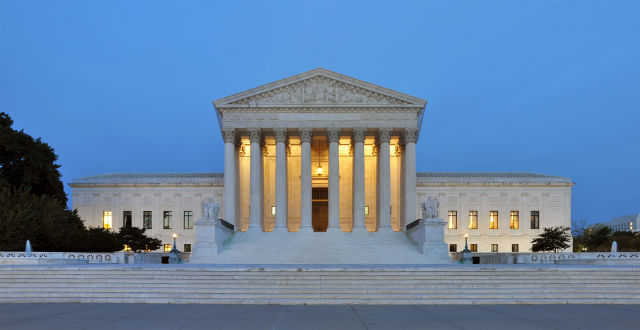
WASHINGTON—The Supreme Court on Monday declined to hear five appeals from the fossil fuel industry seeking to move climate change lawsuits it faces to the federal courts. The decision opens the door for Baltimore and other cities, states, and counties to pursue their claims for damages from climate-related extreme weather events, flooding, and sea-level rise in state courts.
Since the localities began filing their climate suits six years ago, they have, for the most part, seen state courts as the appropriate, and more advantageous, jurisdiction for seeking damages caused by climate change using product liability, deceptive advertising, and nuisance statutes.
They have contended that the industry has known for decades that burning fossil fuels produces greenhouse gases that warm the planet—harming local jurisdictions, their infrastructure, and, ultimately, their citizens.
“Since we filed this case nearly five years ago, the climate crisis has worsened, the costs to Baltimore taxpayers are skyrocketing, and the defendants have pocketed trillions of dollars in profits while trying to dodge accountability for their deception,” Sara Gross, chief of the Affirmative Litigation Division in the Baltimore City Department of Law, said in a statement.
Oil and gas companies, on the other hand, have sought to move these cases to federal courts where the focus would be less on local damages caused by extreme weather and more on national issues related to energy needs and greenhouse gas emissions under the federal Clean Air Act. ExxonMobil, Chevron, and Shell Oil Products were among the parties arguing that issues related to greenhouse gas emissions are “inherently federal.”
The lawsuits before the high court were filed by Rhode Island, the cities of Baltimore, Honolulu, and Imperial Beach, California, and counties in California and Hawaii. Numerous other states, cities, and counties have filed similar suits.
“After decades of climate change deception by the fossil fuel defendants, and now nearly half a decade of delay tactics in our lawsuit to hold them accountable for it, our residents, workers, businesses and taxpayers are ready for their day in court,” said Rhode Island Attorney General Peter F. Neronha.
The fossil fuel companies vowed to continue fighting the lawsuits and pursuing their jurisdictional arguments. “We will continue to fight these suits, which are a waste of time and resources and do nothing to address climate change,” a spokesperson for ExxonMobil said. “Today’s decision has no impact on our focus to invest billions of dollars into leading the way in a thoughtful energy transition that takes the world to net zero carbon emissions.”
John Masslon, senior counsel at the Washington Legal Foundation, a conservative public law firm that filed an amicus brief on behalf of the fossil fuel industry, said the jurisdictional argument is far from decided. “The issue of whether climate change litigation belongs in state or federal court is not going away,” Masslon said. “The Supreme Court will eventually have to resolve the circuit split on this critical issue. Kicking the can down the road will just help pad the bank accounts of lawyers at consumers’ expense.”
To date, at least five federal circuit courts of appeals have considered the jurisdictional issue and concluded that there were insufficient grounds to move the cases from the state courts to federal jurisdiction.
In March, a brief filed by the Biden administration also urged the court not to take up the appeals, arguing that no federal questions had been raised.
This story originally appeared on Inside Climate News.
https://arstechnica.com/?p=1934146

